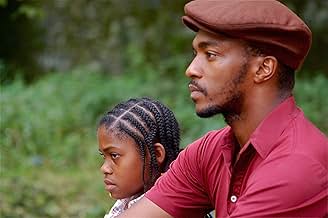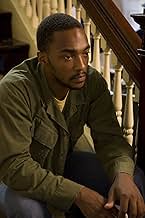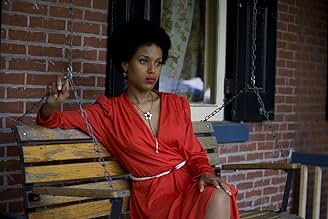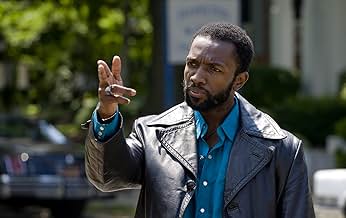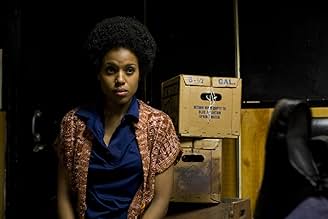CALIFICACIÓN DE IMDb
6.2/10
1.9 k
TU CALIFICACIÓN
Agrega una trama en tu idiomaIn 1976, complex political and emotional forces are set in motion when a young man returns to the race-torn Philadelphia neighborhood where he came of age during the Black Power movement.In 1976, complex political and emotional forces are set in motion when a young man returns to the race-torn Philadelphia neighborhood where he came of age during the Black Power movement.In 1976, complex political and emotional forces are set in motion when a young man returns to the race-torn Philadelphia neighborhood where he came of age during the Black Power movement.
- Premios
- 8 premios ganados y 19 nominaciones en total
- Director
- Guionista
- Todo el elenco y el equipo
- Producción, taquilla y más en IMDbPro
Opiniones destacadas
I just recently watched this movie and thought to myself. This movie is phenomenal especially with Kerry Washington. A must see with a outstanding cast and incredible storyline.
"Night Catches Us" is the best art-house film I've seen in several months. In fact it bests a lot of the current main-screen fare. It deserves better than the quiet and uneven release it seems destined for.
I saw it back-to-back with the Oscar contender "The King's Speech". It balanced the double bill reasonably well. Although "The King's Speech" is of course superior, the comparison wasn't simply ridiculous.
I saw it twice ...which I often do with films I really like, as I tend to miss too many things the first time.
It's not moralistic. Both sides of survival vs. justice, violence vs. pacifism, united front vs. paranoia, victims vs. victimizers, and this generation vs. the next generation are portrayed sympathetically. Although at first glance one particular style of being seems to be being touted over the others, just a little reflection reveals that the film actually revels in moral ambiguity. Some characters manage to stay on the good side of the respectability line at all times, even while their inner demons are picked up and expressed -sometimes in socially unacceptable ways- by others around them. The camera notices more latent contradictions than the story ever delves into. For example the reverend was apparently beloved by the neighborhood, yet also lived in by far the finest house in the whole area.
The film isn't a polemic and doesn't seem to consciously attempt to portray cops in a bad light. Yet it doesn't shy away from sketches of substantial police bad attitude and violence.
"Night Catches Us" makes liberal use of art-house stylistic conventions. For example the confused, tangled, and partially submerged thoughts of a character are portrayed not by talking about them or even by seeing them in action, but by long leisurely shots from underneath of the crossed branches of overgrown vegetation. For another example, a character's longing for stability and tranquility is portrayed by lengthy shots of the proverbial babbling brook.
I wasn't irritated by the pacing. The film is by no means an action flick or a taut thriller, but I didn't find it like watching paint dry either. I tend to like slower paced films anyway (which of course doesn't mean everybody else will too:-). The most similarly paced movie that comes to mind is Clint Eastood's recent "Hereafter"; if you thought that was impossibly slow you'll probably have the same reaction to "Night Catches Us", but if that character exposition and portrayal of small events grabbed you this likely will too.
All the action takes place over just a few days in 1976. A block of important events that happened about a decade earlier is described mainly through bits of dialog. There are no visual flashbacks nor dream sequences (except of course for the occasional interspersed archival Black Panthers footage).
I found the acting quite good. It doesn't bowl you over as the greatest thing you've seen in years; but it's by no means "just workmanlike". Quite often meaning is communicated not by dialog but by subtle body language or facial expressions, which the actors seem fully up to. Both the individual characters and the chemistry between the characters are believably convincing.
I found the situation (or plot if you prefer to think of it that way) simple and complex at the same time. It's simple in that once you finally grasp it you can describe the whole thing in one short paragraph, and in that if you're one of those people who instantly "get" most movie clues you might be able to divine the whole thing well in advance. On the other hand it's complex in that it's revealed only one tiny bit at a time -sometimes in dialog and sometimes visually- so the whole movie can become a "mystery" to be solved if that's your preference.
I saw it back-to-back with the Oscar contender "The King's Speech". It balanced the double bill reasonably well. Although "The King's Speech" is of course superior, the comparison wasn't simply ridiculous.
I saw it twice ...which I often do with films I really like, as I tend to miss too many things the first time.
It's not moralistic. Both sides of survival vs. justice, violence vs. pacifism, united front vs. paranoia, victims vs. victimizers, and this generation vs. the next generation are portrayed sympathetically. Although at first glance one particular style of being seems to be being touted over the others, just a little reflection reveals that the film actually revels in moral ambiguity. Some characters manage to stay on the good side of the respectability line at all times, even while their inner demons are picked up and expressed -sometimes in socially unacceptable ways- by others around them. The camera notices more latent contradictions than the story ever delves into. For example the reverend was apparently beloved by the neighborhood, yet also lived in by far the finest house in the whole area.
The film isn't a polemic and doesn't seem to consciously attempt to portray cops in a bad light. Yet it doesn't shy away from sketches of substantial police bad attitude and violence.
"Night Catches Us" makes liberal use of art-house stylistic conventions. For example the confused, tangled, and partially submerged thoughts of a character are portrayed not by talking about them or even by seeing them in action, but by long leisurely shots from underneath of the crossed branches of overgrown vegetation. For another example, a character's longing for stability and tranquility is portrayed by lengthy shots of the proverbial babbling brook.
I wasn't irritated by the pacing. The film is by no means an action flick or a taut thriller, but I didn't find it like watching paint dry either. I tend to like slower paced films anyway (which of course doesn't mean everybody else will too:-). The most similarly paced movie that comes to mind is Clint Eastood's recent "Hereafter"; if you thought that was impossibly slow you'll probably have the same reaction to "Night Catches Us", but if that character exposition and portrayal of small events grabbed you this likely will too.
All the action takes place over just a few days in 1976. A block of important events that happened about a decade earlier is described mainly through bits of dialog. There are no visual flashbacks nor dream sequences (except of course for the occasional interspersed archival Black Panthers footage).
I found the acting quite good. It doesn't bowl you over as the greatest thing you've seen in years; but it's by no means "just workmanlike". Quite often meaning is communicated not by dialog but by subtle body language or facial expressions, which the actors seem fully up to. Both the individual characters and the chemistry between the characters are believably convincing.
I found the situation (or plot if you prefer to think of it that way) simple and complex at the same time. It's simple in that once you finally grasp it you can describe the whole thing in one short paragraph, and in that if you're one of those people who instantly "get" most movie clues you might be able to divine the whole thing well in advance. On the other hand it's complex in that it's revealed only one tiny bit at a time -sometimes in dialog and sometimes visually- so the whole movie can become a "mystery" to be solved if that's your preference.
I'd encourage anyone interested in watching good acting and film-making to watch "Night Catches Us".
The movie is set in 1976, in Philadelphia, and it is not "Rocky's" S. Philadelphia. The main characters have all had experience/involvement in the Black Panther movement, and the movie cuts a path through the complex feelings and realities that have evolved since they were once involved with it.
It's one of those films that revolves around a core group of characters who've all turned into somewhat different people from when they first knew each other. The dynamic is even more intense because each of the main characters has a tie-in to someone who was obviously a leader or loved one -- indeed it was his death years earlier that led the group to disperse.
I'm kinda bummed that awards seasons might be passing by this gem. Kerry Washington is great, but it's Anthony Mackie's film; he has an intensity and dignity. No overwrought acting.
The movie is set in 1976, in Philadelphia, and it is not "Rocky's" S. Philadelphia. The main characters have all had experience/involvement in the Black Panther movement, and the movie cuts a path through the complex feelings and realities that have evolved since they were once involved with it.
It's one of those films that revolves around a core group of characters who've all turned into somewhat different people from when they first knew each other. The dynamic is even more intense because each of the main characters has a tie-in to someone who was obviously a leader or loved one -- indeed it was his death years earlier that led the group to disperse.
I'm kinda bummed that awards seasons might be passing by this gem. Kerry Washington is great, but it's Anthony Mackie's film; he has an intensity and dignity. No overwrought acting.
The late Sixties found people in life quandaries they could not have imagined based on how they were raised. As the US government continued to kill thousands in other countries they turned also upon their citizens and sought to dampen dissent through the murder of those on what they defined to be the fringes of society. The Black Panthers, Students for A Democratic Society, the Weather Underground, students at Jackson State, Kent State; members found political commitments tied to life and death decisions. How far does one go to dissent? To what does one commit oneself with all their heart and soul? What price is one willing to pay when the corruption and moral bankruptcy of one's nation is no longer tolerable. "Night Catches Us"illuminates the maze of personal and political commitments necessary for living through those times. People no longer put their lives on the line in quite the same way. The US continues to murder thousands across the globe but the protest is only seen on cable television. Gil Scott Heron could not have realized that in the end the revolution would be televised. It just wouldn't have any real impact or foment real change.
I saw one review on this twisted history movie and had to say something. I lived in this era, I saw the Black Panthers kill a lot of people.I lived in Oakland I saw them burning buildings for no reason except they didn't like the school or the people. I saw them beating up teachers who were trying to help them. The only people killed by these so called 'civilians' were other civilians. The hate was incredible, Oakland turned from a thriving metropolis to a town of empty stores, with newspapers flying in the streets. My whole family lived there my Grandparents were born there and my folks, the town was decent it was full of hard working people. Then the haters moved in and started destroying everything. The city did not help they torn down the Victorian homes that were solid and built slums that had rats within 30 days of occupation because the garbage was everywhere. I saw a whole city implode by shooting and gangs the panthers were just one of many; they were just more talked about than the rest. Anyone who thinks the government was wrong helping the Vietnamese people get away from communist aggression didn't hear the cries for help from them when their cities were destroyed and the people killed in the thousands. We lost only because Congress wouldn't let the military do their job and complete their mission. I know many people from south east Asia that would love to go back to their country if they could worship the way they wanted to without being harassed by the communist regime. Communism isn't pretty! people also forget that the era was full of drugs and immorality it wasn't good and didn't do anything to advance civilization in fact I think it went back a few steps! Docudramas are the bargain basement of movies they take 10 percent real history and 90 percent baloney and everyone thinks it really happened that way! Don't waste your time!
¿Sabías que…?
- TriviaThis movie reunites Anthony Mackie and Kerry Washington who previously starred together in Spike Lee's 2004 film 'She Hate Me.'
- ErroresThe film is supposed to take place in 1975, but the blue Chevy Caprice police car is a 1986-1990 model.
- ConexionesReferenced in IMDb's 20th Anniversary Star of the Day: Anthony Mackie (2010)
Selecciones populares
Inicia sesión para calificar y agrega a la lista de videos para obtener recomendaciones personalizadas
- How long is Night Catches Us?Con tecnología de Alexa
Detalles
- Fecha de lanzamiento
- País de origen
- Sitios oficiales
- Idioma
- También se conoce como
- Stringbean and Marcus
- Locaciones de filmación
- Productoras
- Ver más créditos de la compañía en IMDbPro
Taquilla
- Total en EE. UU. y Canadá
- USD 76,185
- Fin de semana de estreno en EE. UU. y Canadá
- USD 13,562
- 5 dic 2010
- Total a nivel mundial
- USD 76,185
- Tiempo de ejecución1 hora 30 minutos
- Color
- Mezcla de sonido
Contribuir a esta página
Sugiere una edición o agrega el contenido que falta

Principales brechas de datos
By what name was Night Catches Us (2010) officially released in India in English?
Responda

